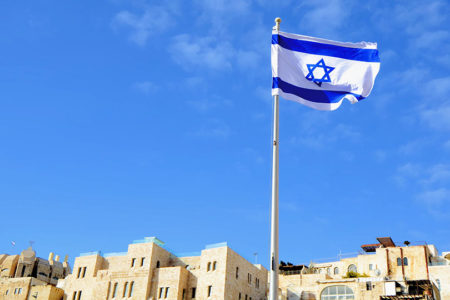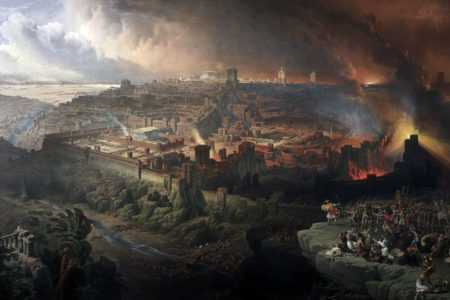God Is Jealous Part Two
Previously we studied God’s jealous response to Jerusalem’s unfaithfulness to Him. Like an unfaithful wife, Israel’s capital city had committed spiritual adultery by worshiping false gods and entering into forbidden alliances with idolatrous nations.
The Nation’s Adultery
Jerusalem’s unfaithfulness was a symptom of the spiritual adultery that characterized most of the nation of Israel.(We must remember, however, that God always preserves a faithful remnant; and in every generation, there have been Jewish people who have been loyal to Him.) God used Hosea’s experience with an unfaithful wife to illustrate His tragic situation with the unfaithful northern kingdom of Israel primarily, but with passing comments about the southern kingdom of Judah as well.
In the book of Hosea, God said the Israelites had “committed great harlotry by departing from the Lᴏʀᴅ” (1:2). He said they sought counsel from wooden idols and “played the harlot against their God” (4:12); were “joined to idols” (v. 17); committed “harlotry continually” (v. 18); “dealt treacherously with the Lᴏʀᴅ” (5:7); did “not return to the Lᴏʀᴅ their God, nor seek Him” (7:10); sought forbidden alliances with idolatrous nations (v. 11); “rebel[led] against” Him (v. 14); and “devise[d] evil against” Him (v. 15).
He also said Israel “transgressed” His “covenant and rebelled against” His “law” (8:1); had “forgotten his Maker” (v. 14); “sacrificed to the Baals, and burned incense to carved images” (11:2); and was “bent on backsliding” from God.
“None at all” exalted Him, He said (v. 7). Instead, people sinned “more and more” and “made for themselves molded images” (13:2). Consequently, God told the northern kingdom, “Surely, as a wife treacherously departs from her husband, so have you dealt treacherously with Me, O house of Israel” (Jer. 3:20).
Because the northern kingdom’s spiritual adultery was so persistent, God “put her away and” gave “her a certificate of divorce” (v. 8). However, it is evident He did not regard that divorce as terminating His spiritual marriage with the nation, for later He exhorted Israel to return to Him, saying, “for I am married to you” (v. 14). He promised to “betroth” the nation to Himself “forever” in righteousness, justice, loving-kindness, mercy, and faithfulness (Hos. 2:19–20).
Through the prophet Jeremiah, God addressed Judah’s spiritual unfaithfulness, but He referenced the northern kingdom significantly. Portraying these kingdoms as two sisters, He declared that even His judgment of the northern sister (Israel) through destruction and captivity by Assyria did not stem Judah’s unfaithfulness: “Her treacherous sister Judah did not fear, but went and played the harlot also,” and “has not turned to Me with her whole heart, but in pretense” (Jer. 3:8, 10). In fact, God said Judah “became more corrupt in her lust…and in her harlotry” than her sister (Ezek. 23:11).
Descriptive Terms
The Bible uses vivid terms to describe God’s jealousy.
Jealousy and Fire. When the word fire is used in a nonliteral sense, its “predominant” sense “is the consuming power of fire.”1 Thus “fire is a common image for the judicial wrath of God.”2 A major emphasis “in the OT [Old Testament] is Yahweh’s judicial intervention in the course of history.”3 “With fiery zeal He watches over obedience to His will.”4
God Himself associates fire with His jealousy: “My burning jealousy” (Ezek. 36:5), “in My jealousy and in the fire of My wrath” (38:19), and “All the earth shall be devoured with the fire of My jealousy” (Zeph. 3:8).
People also associated fire with God’s jealousy. Moses warned the Israelites not to forget the Mosaic marriage covenant that God established with them at Mount Sinai or to make idols to worship, “For the Lᴏʀᴅ your God is a consuming fire, a jealous God” (Dt. 4:23–24). Asaph the psalmist wrote, “How long, LORD? Will You be angry forever? Will Your jealousy burn like fire?” (Ps. 79:5). The prophet Zephaniah referred to “the day of the Lᴏʀᴅ’s wrath” when “the whole land shall be devoured by the fire of His jealousy” (Zeph. 1:18).
Jealousy and Fury. God also associated fury with His jealousy: “I will bring blood upon you in fury and jealousy” (Ezek. 16:38). “So I will lay to rest My fury toward you, and My jealousy shall depart from you” (v. 42). “Thus says the Lord GOD: ‘Behold, I have spoken in My jealousy and My fury’” (36:6). “My fury will show in My face. For in My jealousy and in the fire of My wrath I have spoken” (38:18–19).
The prophet Nahum declared, “God is jealous, and the Lᴏʀᴅ avenges; the Lᴏʀᴅ avenges and is furious” (Nah. 1:2).
The word translated “fury” normally conveyed the concept of an inner, rising, emotional heat that was fanned to varying degrees.5 It could be translated as “anger, hot displeasure, indignation, wrath, rage or fury.”6 Once God experiences fury, “satisfaction of some kind must be made by the execution of judgment upon the cause of it.”7
Jealousy and Wrath. God associated wrath with His jealousy: “For in My jealousy and in the fire of My wrath I have spoken” (Ezek. 38:19). “Neither their silver nor their gold shall be able to deliver them in the day of the Lᴏʀᴅ’s wrath; but the whole land shall be devoured by the fire of His jealousy, for He will make speedy riddance of all those who dwell in the land” (Zeph. 1:18).
The word translated “wrath,” “when used in relation to God, is used as a synonym” of the word translated “fury” in Ezekiel 16:38, 42; 36:6; and 38:18–19.8 “However, it adds the nuance of the fierceness of God’s wrath (Ps. 78:49) expressed in an overwhelming and complete demonstration (Isa. 13:9). God’s wrath burns, overflows, sweeps away everything before it (Ezek. 22:21, 31).”9
Jealousy and Anger. God’s anger is associated with His jealousy: “The Lᴏʀᴅ would not spare him; for then the anger of the Lᴏʀᴅ and His jealousy would burn against that man, and every curse that is written in this book would settle on him, and the Lᴏʀᴅ would blot out his name from under heaven” (Dt. 29:20). “How long, Lᴏʀᴅ? Will You be angry forever? Will Your jealousy burn like fire?” (Ps. 79:5). God said, “My determination is to gather the nations to My assembly of kingdoms, to pour on them My indignation, all My fierce anger; all the earth shall be devoured with the fire of My jealousy” (Zeph. 3:8).
The word translated “anger” emphasizes the following:
The emotional aspect of anger and wrath, whereas its synonyms and terms related to them give particular expression to other aspects….This anger, though fierce (Jer 25:37) is not sinful, evil, or the source of capricious attitudes or deeds. However, it is expressed in chastisement (Ps 6:1; Isa. 12:1) and punishment (II Sam 6:7; Jer 44:6).10
Jealousy and Vexation. God’s covenant people provoked Him “to jealousy with foreign gods; with abominations they provoked Him to anger” (Dt. 32:16, 21; cf. Ps. 78:58). “The root meaning” of the word translated “anger” in these passages “is to vex, agitate, stir up, or provoke the heart to a heated condition which in turn leads to specific action.”11 God was “deeply vexed, agitated, pained, or grieved by disobedient Israel.”12 Israel’s “judgment, in keeping with God’s justice, is not contrary to divine love. Rather it is an expression of divine love which has been offended, rejected and deeply grieved.”13
Objects of God’s Jealousy
Scripture reveals several objects of God’s jealousy.
His People Israel. “Now Judah did evil in the sight of the Lᴏʀᴅ, and they provoked Him to jealousy with their sins which they committed, more than all that their fathers had done” (1 Ki. 14:22; cf. Ps. 78:58). The nation was unfaithful to its Mosaic Covenant marriage relationship with God.
God’s Land and His People. God declared, “the land is Mine” (Lev. 25:23). Because He is the owner, He stated, “Surely I have spoken in My burning jealousy against the rest of the nations and against all Edom, who gave My land to themselves as a possession, with whole–hearted joy and spiteful minds, in order to plunder its open country” (Ezek. 36:5). “Then the Lᴏʀᴅ will be zealous for His land, and pity His people….I will no longer make you a reproach among the nations” (Joel 2:18–19). God was jealous for His people and avenged their cruel treatment by the Assyrians (Nah. 1:2).
Jerusalem and Zion. The term Zion originally referred to the mound on which stood the Jebusite city that David conquered. Eventually that city was called the City of David. Over time, the term Zion included the Temple Mount and later the entire city of Jerusalem.14 God expressed His attitude concerning Jerusalem and Zion in these statements:
Thus says the Lᴏʀᴅ of hosts: “I am zealous for Jerusalem and for Zion with great zeal. I am exceedingly angry with the nations at ease; for I was a little angry, and they helped––but with evil intent.” Therefore thus says the Lᴏʀᴅ: “I am returning to Jerusalem with mercy; My house shall be built in it,” says the Lᴏʀᴅ of hosts, “and a surveyor’s line shall be stretched out over Jerusalem.” Again proclaim, saying, “Thus says the Lᴏʀᴅ of hosts: ‘My cities shall again spread out through prosperity; The Lᴏʀᴅ will again comfort Zion, and will again choose Jerusalem.’” Thus says the Lᴏʀᴅ of hosts: “I am zealous for Zion with great zeal; with great fervor I am zealous for her.” Thus says the Lᴏʀᴅ: “I will return to Zion, and dwell in the midst of Jerusalem. Jerusalem shall be called the City of Truth, the Mountain of the Lᴏʀᴅ of hosts, the Holy Mountain” (Zech. 1:14–17; 8:2–3).
The major word for “jealousy” in the Old Testament can mean “to be zealous.”
God’s Name. God declared, “I will be jealous for My holy name” (Ezek. 39:25). The next article will examine the relationship of God’s jealousy to His holy name.
ENDNOTES
- Friedrich Lang, “pur,” Theological Dictionary of the New Testament, ed. Gerhard Friedrich, trans./ed. Geoffrey W. Bromiley, translated from Theologisches Worterbuch zum Neuen Testament (Grand Rapids: Eerdmans, 1968), 6:935.
- Ibid.
- Ibid., 936.
- Ibid., 937.
- Gerard Van Groningen, “hema,” Theological Wordbook of the Old Testament (hereafter cited as TWOT), ed. R. Laird Harris, Gleason L. Archer Jr., and Bruce K. Waltke (Chicago: Moody Press, 1980), 1:374.
- Ibid.
- Ibid., 375.
- Gerard Van Groningen, “ebra,” TWOT, 2:643.
- Ibid.
- Gerard Van Groningen, “ap,” TWOT, 1:58.
- Gerard Van Groningen, “kaas,” TWOT, 1:451.
- Ibid.
- Ibid.
- Steven Barabas, “Zion,” The New International Dictionary of the Bible, Pictorial Edition, revising ed. J. D. Douglas, ed. Merrill C. Tenney (Grand Rapids: Zondervan, 1987), 1,089.







